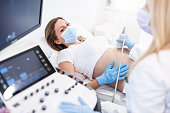
According to Johns Hopkins University (2021), “An estimated 26% of Americans ages 18 and older — about 1 in 4 adults — suffers from a diagnosable mental disorder in a given year.” Among the many mental health disorders, eating disorders happen to be one of the deadliest. Eating disorders frequently co-occur with anxiety, depression, post traumatic stress disorder (PTSD), and dramatically impact the body. Eating Disorders affect all aspects of physical functioning, particularly the reproductive system. Many people with eating disorders find that fears and questions abound related to fertility and reproductive health. Let’s answer a few.
1. What is amenorrhea?
Amenorrhea, in simple terms, is the absence of menstrual periods. There are a few classifications for amenorrhea. Primary amenorrhea is when a female has not had a menstrual period by the age of 15 or after (Welt & Barbieri, 2021). Females with eating disorders before the age of 15, may have delayed menstruation. Secondary amenorrhea is when a female has already started having regular menstrual periods but has stopped having a menstrual period for 3 months. Females who have irregular menstrual periods are considered to have secondary amenorrhea when they have not had a menstrual period for 6 months (Welt & Barbieri, 2021)
2. What is oligomenorrhea?
Oligomenorrhea is having fewer than 9 periods in a year. Females with oligomenorrhea will have periods less frequently than the average 28-day menstrual cycle. (Welt & Barbieri, 2021)
3. Can I still get pregnant even though I’m not menstruating or my periods are irregular?
Yes! In general, with a 28-day cycle, ovulation takes place around day 14. Even though you are not menstruating, you can still be ovulating, therefore, you can still get pregnant with unprotected sex. If your periods are irregular, you can still ovulate and therefore become pregnant. For women who are trying to become pregnant, it may be harder for them to conceive if a woman’s menstrual periods are irregular, therefore making it harder to determine when ovulation occurs.
4. Are those with anorexia nervosa the only ones at risk for not having a menstrual period?
The answer is NO. Those with anorexia nervosa are generally at higher risk for amenorrhea, however, females with binge-eating due to the hormone imbalances of insulin and testosterone are also at risk (Kimmel et al., 2016, pg. 262).
5. How does body fat contribute to menstruation and fertility?
Leptin is a hormone that is released from fat cells. When the body senses a disruption such as starvation, the amount of hormones released from the hypothalamus is decreased. With decreased levels of leptin, it causes decreased levels of luteinizing hormone (LH). LH and Follicle Stimulating Hormone (FSH) are the important hormones that play roles in ovulation and menstruation (Kimmel et al., 2016, pg. 265). FSH causes the stimulation of the eggs to grow in the ovaries. LH causes the egg to be released from the ovary. When LH levels are too low, eggs are not released from the ovaries, therefore not allowing those trying to conceive to be able to do so.
6. What kind of eating disorders are associated with oligomenorrhea?
Those with Bulimia nervosa and binge eating are at higher risk of having oligomenorrhea possibly due to FSH and LH imbalances. They are also at higher risk for having miscarriages than those with anorexia nervosa (Kimmel et al., 2016, pg. 265; Linna et al., 2013, p. 831).
7. When will my menstrual period start again if I have an eating disorder?
Individuals with anorexia nervosa will generally start having a menstrual period when they reach the weight of when their menses stopped. Sometimes, they may have to gain a little more weight in order to have a menstrual period again (Kimmel et al., 2016, pg. 262.) However, sometimes women don’t start their menstrual period despite being weight restored. In this case, under the care of a health professional, they may be given hormones to jump-start their period. Those with binge eating disorders and bulimia nervosa sometimes have Polycystic Ovarian Syndrome PCOS. When a woman has PCOS, they may have to be treated with the medication metformin (Kimmel et al., 2016, pg. 264).
8. Is there an eating disorder that is at higher risk of infertility?
Studies have shown that those with anorexia nervosa when compared to women that don’t have an eating disorder, have similar pregnancy rates. Those with bulimia nervosa and binge eating disorders have shown to have higher rates of miscarriages (Kimmel et al., 2016, pg. 265)
It is recommended before a woman becomes pregnant, that she receive effective, multidisciplinary treatment for her eating disorder. Additionally, women with eating disorders who are pregnant or wish to become pregnant should see an obstetrician that works with high-risk pregnancies to help guide them through a healthy pregnancy.
If you are interested in more information on eating disorders, please review our blog entries at: https://avalonhills.org/blog/
References
Johns Hopkins University. (2021). Mental Health Disorder Statistics. Retrieved from:
https://www.hopkinsmedicine.org/health/wellness-and-prevention/mental-health-disorder-statisti cs
Kimmel, M. C., Ferguson, E. H., Zerwas, S., Bulik, C. M., & Meltzer-Brody, S. (2016). Obstetric and gynecologic problems associated with eating disorders. The International Journal of Eating Disorders, 49(3), 260–275. DOI: 10.1002/eat.22483

